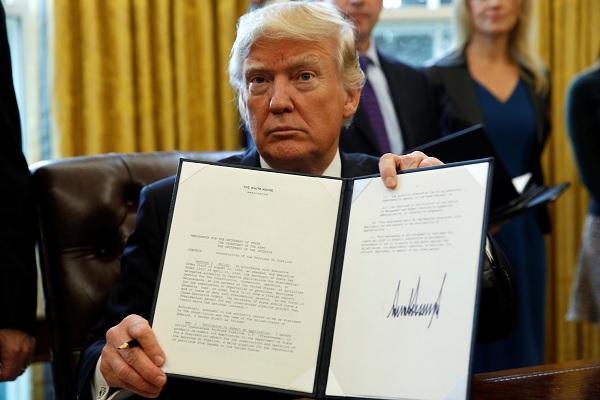
Attorney Scott Pilutik wrestles with the news of the day, from a lawyerly perspective…
[Regarding this story: Trump expected to sign executive order that could threaten punishment against Facebook, Google and Twitter over allegations of political bias]
Trump is cooking up a legally dubious executive order which will probably direct the formation of a panel to investigate political bias by social media companies and make recommendations to change existing law.
It seems unlikely anything will come of it and I’ll try to explain why I think that.
The Washington Post article suggests that Article 230 (of the Communications Decency Act) is on the table. Section 230 is basically a safe harbor for online service providers so that they’re not liable for their users’ defamatory or harmful content. Without it, online service providers would be forced to police their users’ content because they’d effectively share their users’ liability.
Of course, many social media companies already police their users’ content anyway because it’s in their financial interest to keep their sites clear of things like child pornography. They need to balance tolerance for speech with attracting traffic. But without Section 230, they’d be policing far more, and lots more content would disappear from the Internet (or move to Russia, which hosts pretty much anything).
So why is the White House signaling that Section 230 is in their crosshairs? I have no idea. Any change that either killed 230 or carved out an exception to 230 would merely cause Twitter to police more content, which is the opposite of what Trump wants from Twitter, which is for them to stop policing his content.
What Trump really wants but which no one is yet saying is an online “Fairness Doctrine.” The irony is that conservatives were chiefly responsible for killing the Fairness Doctrine.
As I mentioned yesterday, what Trump wants violently collides with first amendment concerns. Any law that presumes political bias as a given (that would, say, penalize Twitter for policing political content “unevenly”) would be immediately suspect as regulating speech based on content, and be doomed in court. Unlike Trump, judges have no trouble grasping that speech laws cut two ways.
For practical purposes, any real change would require passage in the both houses, so there’s little chance that what I’m describing above will come to pass, at least this congressional term. But Trump will nevertheless “work the refs” by creating a national debate premised on private companies’ unfairness toward poor Republican victims. At least Twitter’s right to not be forced to bake gay wedding cakes remains intact.






